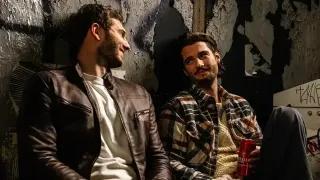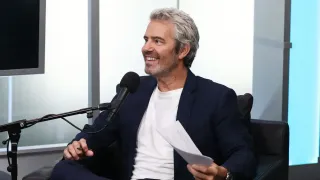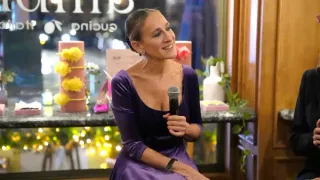
4 hours ago
Alexander Lincoln Opens Up About Queer Romance, Identity, and Rugby Fears in New Interview
READ TIME: 15 MIN.
Alexander Lincoln, celebrated for his nuanced performances and outspoken advocacy, steps into the spotlight again with the release of "A Night Like This", a film exploring queer intimacy and the fleeting moments that shape our lives. In a recent interview with Queerty, Lincoln discusses how the movie diverges from typical LGBTQ+ narratives by focusing on connection and vulnerability rather than solely on sexuality or trauma .
The film, directed by Liam Calvert, follows two men—Lukas and Oliver—who meet in London for a single transformative night. Lincoln portrays Oliver, a character whose privileged bravado is juxtaposed with deep existential uncertainty. Speaking to "Gay Times", Lincoln notes, “It’s about this really beautiful element of a relationship, where it’s just two strangers meeting and truly seeing each other,” emphasizing the film’s focus on authentic queer experiences .
Lincoln’s performance is rooted in a desire to depict LGBTQ+ people as complex individuals, challenging stereotypes and tropes often seen in mainstream media. In the Queerty interview, he shares that playing Oliver allowed him to reflect on loneliness and connection, themes that resonate deeply within LGBTQ+ communities, where chosen families and transient relationships often carry profound significance .
The actor also speaks about the chemistry between himself and co-star Jack Brett Anderson, which was instrumental in bringing depth and realism to the story. Lincoln describes their collaboration as “instant,” highlighting how supportive creative partnerships can foster genuine representation on screen .
Beyond his professional life, Lincoln opens up about what makes a dream date night for him: “It’s less about the setting and more about feeling truly seen,” he tells Queerty, emphasizing the importance of authenticity and emotional connection over grand gestures .
His candor extends to personal fears, notably his relationship with rugby. Once a fan and participant, Lincoln admits he is now “terrified” of the sport, citing the pressures of masculinity and the sometimes exclusionary culture within athletic spaces. This shift reflects broader conversations about how traditional sports environments can be challenging for LGBTQ+ people, who may face harassment or feel compelled to conceal their identities .
Lincoln’s journey with his own sexuality has been a topic of public interest since he first described himself as “not straight” two years ago. In the Queerty interview and in subsequent appearances, he elaborates on his evolving understanding of identity, stressing that labels may be helpful for some but limiting for others. “Visibility is vital, but so is the space to explore without pressure,” he says, echoing sentiments shared during his interview with *Attitude* magazine, where he discussed bisexuality and the importance of nuanced representation .
The actor’s willingness to speak openly about his experiences has earned him praise from LGBTQ+ advocacy groups, who see his story as empowering for those questioning or navigating their identities .
Lincoln’s latest work and public commentary are part of a broader shift toward more diverse and authentic LGBTQ+ storytelling in film and television. By prioritizing character-driven narratives and rejecting reductive stereotypes, *A Night Like This* exemplifies the power of queer stories to transcend boundaries and foster empathy .
Industry observers note that actors like Lincoln play a critical role in challenging the status quo, encouraging media creators to center LGBTQ+ voices both on and off screen. As Lincoln puts it, “We’re more than our labels, and our stories deserve to be told with honesty and care” .
With "A Night Like This" now in cinemas and Lincoln’s profile rising, the conversation around queer visibility and inclusion continues to gain momentum. As LGBTQ+ audiences seek stories that reflect the full spectrum of experience, artists like Lincoln demonstrate the importance of vulnerability, authenticity, and advocacy in shaping a more inclusive media landscape .






